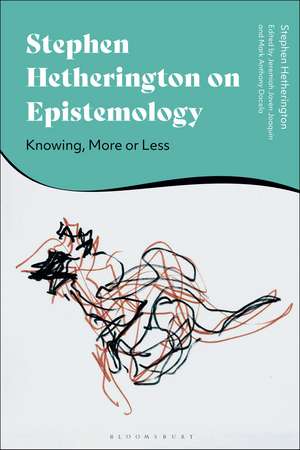Stephen Hetherington on Epistemology: Knowing, More or Less
Autor Professor Stephen Hetherington Editat de Jeremiah Joven Joaquin, Mark Anthony Dacelaen Limba Engleză Hardback – 15 mai 2024
Preț: 511.07 lei
Preț vechi: 731.59 lei
-30% Nou
Puncte Express: 767
Preț estimativ în valută:
97.81€ • 101.04$ • 81.40£
97.81€ • 101.04$ • 81.40£
Carte tipărită la comandă
Livrare economică 25 martie-08 aprilie
Preluare comenzi: 021 569.72.76
Specificații
ISBN-13: 9781350344747
ISBN-10: 1350344745
Pagini: 288
Dimensiuni: 156 x 234 mm
Greutate: 0.54 kg
Editura: Bloomsbury Publishing
Colecția Bloomsbury Academic
Locul publicării:London, United Kingdom
ISBN-10: 1350344745
Pagini: 288
Dimensiuni: 156 x 234 mm
Greutate: 0.54 kg
Editura: Bloomsbury Publishing
Colecția Bloomsbury Academic
Locul publicării:London, United Kingdom
Caracteristici
Links Hetherington's philosophical views on issues such as knowledge, justification, fallibility, scepticism and the Gettier Problem
Notă biografică
Stephen Hetherington is Emeritus Professor of Philosophy at University of New South Wales, Sydney, Australia. Jeremiah Joven Joaquin is Professor of Philosophy at De La Salle University, Philippines.Mark Anthony Dacela is Associate Professor of Philosophy at De La Salle University, Philippines.
Cuprins
Editorial Introduction: Interview with Stephen Hetherington 1. Epistemic Internalism's Dilemma 2. How is Epistemology Even Possible? 3. Elusive Epistemological Justification 4. Gettieristic Scepticism 5. Epistemic Disaster Averted 6. Knowing Imperfectly 7. Sceptical Possibilities? No Worries 8. Knowledge That Works: A Tale of Two Conceptual Models 9. Knowledge as Potential for Action 10. Skeptical Challenges and Knowing Actions 11. Some Fallibilist Knowledge: Questioning Knowledge-Attributions and Open Knowledge 12. The Luck/Knowledge Incompatibility Thesis 13. The Redundancy Problem: From Knowledge-Infallibilism to Knowledge-Minimalism 14. And Next? Bibliography Index
Recenzii
Epistemic principles can and must satisfy their own strictures. Knowledge is an all-or-nothing affair. Gettierized individuals fail to know. Skepticism is well-founded. Hetherington demurs, arguing that if epistemology abandons these assumptions, knowledge is achievable, gradable, realized in practice, consonant with epistemic vulnerability. The result is a radical, powerful reconception of epistemology.
This is a truly wonderful collection of challenging essays. They really bring to the fore the central, Fallibilist core of Hetherington's unique epistemology. An attitude which, in a field whose contemporary climate is still regulated by fashionistas and cliquey citation practices, continues to be a breath of fresh air.
This is a truly wonderful collection of challenging essays. They really bring to the fore the central, Fallibilist core of Hetherington's unique epistemology. An attitude which, in a field whose contemporary climate is still regulated by fashionistas and cliquey citation practices, continues to be a breath of fresh air.
